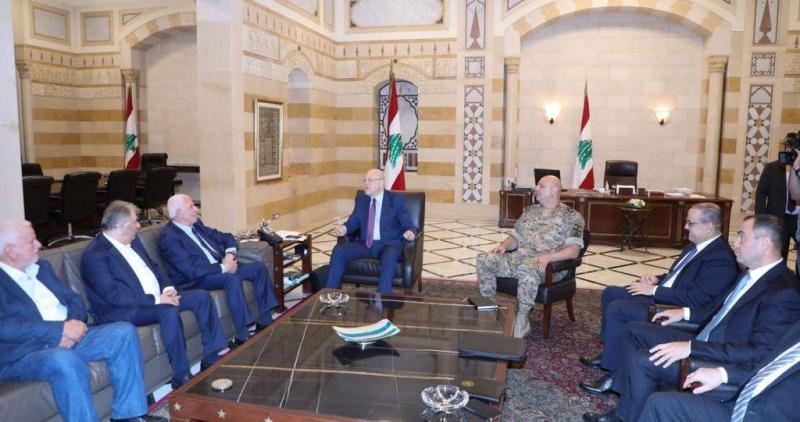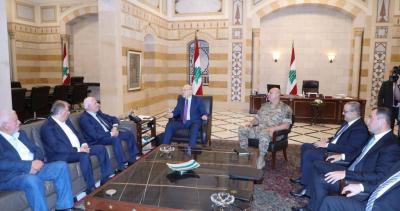Lebanon's caretaker Prime Minister Najib Mikati held a meeting this Wednesday morning at the Grand Serail to discuss the situation in the Ain al-Hilweh camp. The meeting included Palestinian representatives such as member of the Executive Committee of the Palestine Liberation Organization Azam Al-Ahmad, Palestinian Ambassador to Lebanon Ashraf Dabbour, and Secretary of the Fatah Movement Fathi Abou al-Erdat. On the Lebanese side, the meeting was attended by Army Commander General Joseph Aoun, Acting Director General of General Security Major General Elias Bechara, Head of Military Intelligence Brigadier General Tony Kahwaji, and Chairman of the Lebanese-Palestinian Dialogue Committee Dr. Basil Al-Hassan.
After the meeting, Al-Ahmad stated, "This meeting is a continuation of the previous meeting held a month ago, where we agreed to establish a ceasefire and halt the destruction and random killings carried out by some outlaws exploiting the nature of Ain al-Hilweh camp. We also agreed at that time to form an investigative committee, which has been established and completed its work, identifying those implicated in the assassination of Major General Abu Ashraf Al-Armouchi. After the committee concluded its work and submitted its findings and names to the Palestinian Joint Action Authority, it was necessary first to allow the displaced persons to return to their homes."
He continued, "At that stage, on the fifth day, there were no displaced persons from the camp; however, the terrorist elements outside the law persisted in violating the ceasefire and continuing their gunfire and bombardments indiscriminately, not only within the camp and the schools where they fortified themselves but even throughout Sidon, in addition to shelling Lebanese army sites and barracks, as if someone was instructing them to ignite the security situation in the area, not just in the camp but in the neighboring areas and Sidon, which indicates that there is a conspiracy larger than what some may envision."
He noted that "negotiations led by the head of the Lebanese-Palestinian Dialogue Committee, Dr. Basil Al-Hassan, nearly reached an agreement, but it turned out that it was a maneuver on their part, even from the forces that contacted them to relay the demands proposed by Dr. Al-Hassan. The Lebanese authority and the Lebanese state have the responsibility to impose and uphold the law, and everyone must be under this law, primarily us as Palestinians. This is a sovereign issue that we respect and adhere to. However, it is clear that they have ties to foreign intelligence entities that are documented with us and known to all, as reported in the Lebanese newspapers, which I do not wish to mention directly. Lebanese officials are aware of this, as we heard just moments ago, and it is known by everyone. Therefore, in this meeting, we agreed to adhere to what we have decided and the necessity to prevent bloodshed, affirm the ceasefire, and hand over those involved in the assassination of Al-Armouchi and his companions, and before him, Abdel Rahman Al-Farhoud, who was assassinated days before Al-Armouchi."
Al-Ahmad emphasized that they must "not exploit the current political and economic conditions and the existing vacuum to disrupt Lebanon." In response to a question, he stated, "Our brothers in the Lebanese leadership will contact all parties capable of conveying this decision to everyone without exception, including those fortifying themselves in the schools that need to be vacated as soon as possible, before the academic year begins, which threatens more than six thousand students in the camp from continuing their studies."
He added, "We have set a timeframe that is not long, based on the points we established, namely the handing over of the murderers to the Lebanese judiciary, which is the sovereignty-holder." Regarding the possibility of a refusal to surrender and returning to military resolution, he said, "All options are open before us, and we have agreed on them, and we prefer the option of reason. If there are people misled by foreign or other entities benefiting from this situation, that is their fault, not the choice of the Lebanese state or the State of Palestine. We and the Lebanese leadership trust each other and coordinate everything step by step, and we do not take unilateral action, nor do our brothers in the Lebanese government and Lebanese state institutions take unilateral actions either. This is an opportunity to confirm to the people of Sidon, its stakeholders, forces, and parties, and also to the neighborhood that there are those who want to expand chaos and confrontation."
He reiterated that on Tuesday, "there was communication from the intelligence of a foreign state within Lebanon with these individuals regarding the situation, inciting and offering temptations to serve their agenda. Israel is not far from what is happening, and even the internal Lebanese situation and the forces benefiting from this vacuum and the political and economic crisis do not wish for good for Lebanon, but for chaos. However, we trust the wisdom of the Lebanese leadership and its ability to confront such attempts, and we will stand by it."




